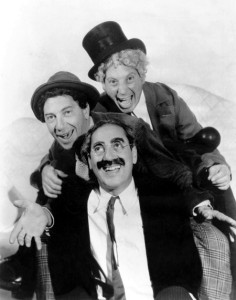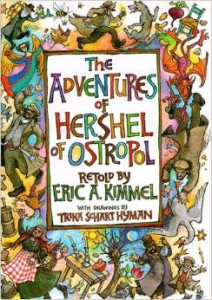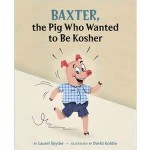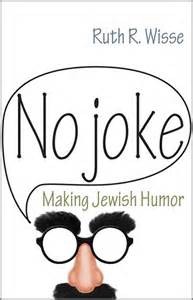Notes From the Lampert Library
This column features books from the Helen S. Weiss Jewish Humor Collection in the Lampert Library.
 Have you ever noticed how a funny remark, a quip, a self-deprecating comment can diffuse a tense situation. If only world leaders used humor more! Mark Twain said that “The human race has only one really effective weapon and that is laughter.” And Voltaire said that man is the only animal that has a sense of humor-and the only animal that needs one to survive the world. Really he was speaking about blushing but it sounds good.
Have you ever noticed how a funny remark, a quip, a self-deprecating comment can diffuse a tense situation. If only world leaders used humor more! Mark Twain said that “The human race has only one really effective weapon and that is laughter.” And Voltaire said that man is the only animal that has a sense of humor-and the only animal that needs one to survive the world. Really he was speaking about blushing but it sounds good.
Jews are especially known for their comic sense which dates back to Torah and Midrash. Didn’t Sarah laugh when she was told that at her advanced age she would have a child? Arguments in the Talmud often verge on the absurd in order to get a point across.
In more modern times Jews have been represented far beyond their numbers in vaudeville, radio, stand-up comedy, film, TV, sit-coms. Jewish comedians were household names in the Golden Age of television: Milton Berle, Jack Benny, Gertrude Berg, George Burns and so many more come to mind. Today there are John Stewart, Louis C.K. and Sarah Silverman among others.
Saul Bellow, explaining the Jewish propensity for humor, observed that an oppressed people tends to be witty. “Jewish jokes,” stated Irving Saposnik, a professor of Yiddish literature, “became a way for Jews to define the unfair world. … By being able to voice their thoughts, they no longer felt discomfort and displacement. Jewish jokes and words entered mainstream America, and their comic abnormality became the American norm.”
 Additionally, Rabbi Moshe Waldoks, a scholar of Jewish humor, said, “A sense of humor can help you overlook the unattractive, tolerate the unpleasant, cope with the unexpected, and smile through the unbearable.” That’s a lot of what Jewish humor is and does.
Additionally, Rabbi Moshe Waldoks, a scholar of Jewish humor, said, “A sense of humor can help you overlook the unattractive, tolerate the unpleasant, cope with the unexpected, and smile through the unbearable.” That’s a lot of what Jewish humor is and does.
One does not have to be a religious Jew to be a Jewish comic or appreciate Jewish humor. A 2013 Pew Research Study of both religious and secular Jews showed that 42% of those surveyed felt that humor was essential to Jewish identity. Self-deprecating humor, stories of fools and pranksters, conflict between children and parents, stories of rabbis, and observations on assimilation and anti-Semitism are all fodder for the Jewish comic.
Today’s humor still has that edge and tone of self-flagellation, of sarcasm and absurdity, of the everyday and the divine. And research has even shown that humor and laughter are good for one’s health.
Here are a couple of short examples of Jewish humor:
A mother asks her son: Is one Nobel Prize too much to ask after all I’ve done for you?
A man asks the rabbi if it permitted to fly in an airplane on Shabbat. Yes, the rabbi replies, as long as your seat belt is always fastened. It is considered that you are not riding; you are wearing the plane!
Check out the following for more taste of Jewish humor:


- Adler, Adventures of Hershel of Ostropol (trickster tales)
- Adler, Children of Chelm (fools)
- Allen, Mere Anarchy (Woody Allen)
- Antler, You Never Call; You Never Write (mothers and sons)
- Gellman, Does God Have a Big Toe?: Stories about Stories in the Bible (midrashim)
- Rosten, Leo Rosten’s Carnival of Wit
- Rojstaczer, Mathematician’s Shiva
- Schwartz, Yossel Zissel
- Snyder Baxter, the Pig Who Wanted to be Kosher
- Spalding, Treasure Trove of American Jewish Humor
- Taback, Kibitzers and Fools: Tales My Zayda Told Me
- Telushkin, Jewish Humor
- Wex, Born to Kvetch
- Wisse, No Joke
- Ziv, Jewish Humor
- Is It Passover Yet? - Thu, Apr 18, 2024
- MESH Report April 9, 2024 - Thu, Apr 11, 2024
- Guess Who? - Wed, Mar 13, 2024
